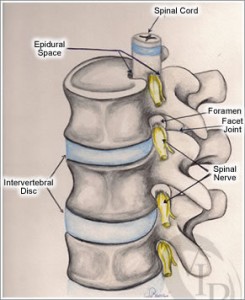A Provocative Discogram is a minimally invasive procedure that involves injecting contrast dye into a spinal disc. Using X-Ray imaging (fluoroscopy), a small needle is placed within the disc and contrast is injected. This will determine if the disc is the source of the patient’s back pain.
An Analgesic Discogram is a similar procedure where local anesthetic with steroid is injected into the suspect disc without first provoking the pain. If the pain in the back improves significantly, this proves the suspect disc is the source of pain. Recently this procedure has been shown to be more accurate in diagnosing “discogenic pain”
Preparing for your Discogram:
- A representative will call you prior to your appointment to review your medications and registration information.
- Be sure to let your doctor know if you are taking blood thinners (Aspirin, Lovenox, Plavix, Heparin, or Coumadin). You MAY be asked to stop this medication 5 days prior to your procedure. You may resume your medication the day after your procedure.
- You will need to arrange for a driver to take you home.
- Nothing to eat or drink 2 hours prior to your appointment time.
- The disc to be studied will be injected with contrast dye, local anesthetic and steroid. If you have an allergy to any of these medications please notify our representative, scheduler, or nurse as soon as possible.
- Including recovery time, you should plan to spend about 1 hour at the imaging center.
- You may experience some soreness at the injection site for up to 24 hours. This can be managed with over the counter analgesics such as ibuprofen or aspirin. Cold ice packs 3-4 times daily for several days are also effective. You may take your own pain medication if it is already prescribed by your referring physician.
- You can return to light activity the day of your procedure and avoid strenuous activity or physical therapy for the next 3 days.
If you develop fever or severe pain contact our office at 352-333-7847 (7VIP) or call your referring physician. After hours or on weekends, go to the nearest emergency room or call North Florida Regional Medical Center at 352-333-4000 and ask for the Radiologist on call.


